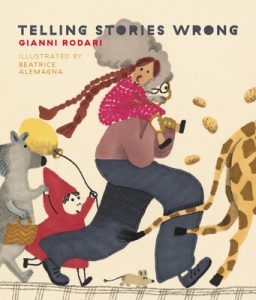 Telling Stories Wrong
Telling Stories Wrong
Written by Gianni Rodari
Illustrated by Beatrice Alemagna
Translated by Antony Shugaar
Enchanted Lion Books, 2022, 32 pp
ISBN: 978-1592703609
A grandfather tells the story of Little Red Riding Hood to his granddaughter, but much to the joy and exasperation of the little girl, the grandfather keeps changing the details of the story. Little Red becomes Little Yellow, then Little Green and finally Little Black. She takes potato peels to her Aunt Hildegard instead of a warm loaf of bread to her grandmother. On the way she meets a giraffe. When corrected, the grandfather explains that the wolf asks Little Red “How much is six times eight?” After Little Red goes to the store for a jar of tomato sauce, the wolf reappears and suggests that everyone take bus #75 which stops in front of the cathedral where they will find a quarter on the ground that can be used to buy some bubble gum. This story gone wrong concludes with a big hug, a real quarter for the little girl, and some quiet newspaper reading for Grandfather.
While Telling Stories Wrong at first glance seems like a simple narrative portraying the warm relationship between the grandfather and granddaughter, it is a significant book that illustrates the storytelling pedagogy of Gianni Rodari. Born in 1920 in Italy, he lived through the turbulent fascist years. Following WWII, he became a journalist and eventually an author for children. He is considered the father of modern Italian children’s literature. The years between the World Wars shaped his desire to encourage children to ask questions that would give them tools for solving social issues they would later face as adults. Telling Stories Wrong is a demonstration of what Rodari believed: that fairy tales are rich food for developing imaginations which can lead to critical thought and imaginative problem-solving. He wrote, “I think that fairy tales–both old and new–can help in the development of the mind. Fairy tales are the place of all hypotheses — they can give us the keys and help find new ways to reality. They can help the child learn about the world and give them the ability to evaluate it” (Rodari, 1970). Telling Stories Wrong is full of imaginative detours in the tale of Red Riding Hood.
The illustrations add to the nonsensical version by adding details that show the grandfather and granddaughter interacting about the changes and even entering into the story action. Their words and thoughts are captured in speech and thought bubbles but their body language contributes as well. Grandpa’s eyes get oversized behind his glasses and the granddaughter’s braid is as expressive as her face and words. The images are rendered on sepia-toned paper with markers and wash, resembling illustrations by a child. The book was named one of the New York Times/New York Public Library Best Illustrated Children’s Books for 2022 and an Outstanding International Book by USBBY.
This book pairs well with stories of child/wolf interactions. In The Girl and the Wolf, written by Katherena Vermette and illustrated by Julie Flett (2019), a young girl is lost in the forest, but a wise wolf helps her understand that she has all the tools she needs to find her way back home. In Wolf in the Snow (Matthew Cordell, 2017) a young girl in a red coat helps a wolf pup return to his wolf pack. The adult wolves in turn help her parents find her when she becomes lost in the snowy forest. Another type of book pairing is a variant on the Red Riding Hood classic tale. In Interrupting Chicken (David Ezra Stein, 2010), Little Red Chicken changes the end of the bedtime story to rescue Red Riding Hood from the wolf. There are many cultural variants, but a favorite is Petite Rouge: A Cajun Red Riding Hood, written by Mike Artell and illustrated by Jim Harris (1999), in which a hungry swamp gator meets his match in Little Red, a smart duck.
Gianni Rodari (1920-1980) was a well-known children’s author in Italy, and winner of the 1970 Hans Christian Andersen medal. He wrote the Batchelder winner Telephone Tales (2020), a set of stories inside a story that is full of fantasy and fun, from which Telling Stories Wrong is taken. A teacher, journalist and author, he wrote The Grammar of Fantasy (1996) as a way of encouraging imaginative and critical thought. He collaborated closely with children, reading and revising his manuscripts following his discussions with them.
Beatrice Alemagna is an illustrator from Italy who now lives in France. She grew up reading the stories of Rodari and considers him a mentor. Alemagna has exhibited her work at solo and collective exhibitions in Paris, Bologna, Bordeaux, Charleville, Munich, Reims, Lisbon, Tokyo, Sapporo, Kyoto, Stockholm, Dublin, Beijing, Abu Dhabi, Sofia, Cairo, Madrid, Berlin. She has been nominated to the Astrid Lindgren Memorial Award four times (in 2014, 2015, 2016 and 2017).
Antony Shugaar translates books, articles, scripts and screenplays for TV, and movies for HBO, Netflix, and Amazon from Italian and French. He translated Gianni Rodari’s Telephone Tales from which comes this book Telling Stories Wrong.
Reference
Rodari, G. (1970). Winners of the Hans Christian Andersen Award 1970. Bookbird, VIII (2), p. 4.
Susan Corapi, Trinity International University, Chicago, Illinois
© 2022 by Susan Corapi

